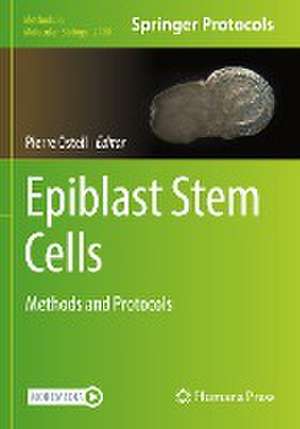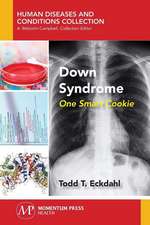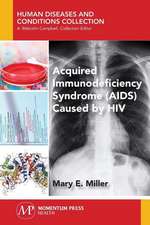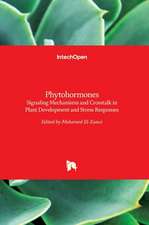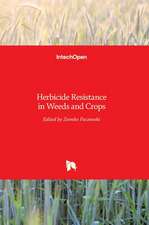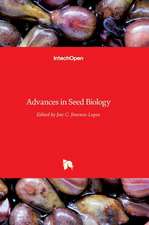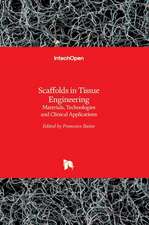Epiblast Stem Cells: Methods and Protocols: Methods in Molecular Biology, cartea 2490
Editat de Pierre Osteilen Limba Engleză Paperback – 30 apr 2023
Authoritative and practical, Epiblast Stem Cells: Methods and Protocols serves as an ideal guide to overcome the reproducibility problem by gathering detailed state-of-the-art protocols to perform comprehensive analyses, enabling the reader to opt for the appropriate cell type to model the epiblast.
| Toate formatele și edițiile | Preț | Express |
|---|---|---|
| Paperback (1) | 731.28 lei 6-8 săpt. | |
| Springer Us – 30 apr 2023 | 731.28 lei 6-8 săpt. | |
| Hardback (1) | 1011.14 lei 6-8 săpt. | |
| Springer Us – 30 apr 2022 | 1011.14 lei 6-8 săpt. |
Din seria Methods in Molecular Biology
- 9%
 Preț: 791.59 lei
Preț: 791.59 lei - 23%
 Preț: 598.56 lei
Preț: 598.56 lei - 20%
 Preț: 882.95 lei
Preț: 882.95 lei -
 Preț: 252.04 lei
Preț: 252.04 lei - 5%
 Preț: 802.69 lei
Preț: 802.69 lei - 5%
 Preț: 729.61 lei
Preț: 729.61 lei - 5%
 Preț: 731.43 lei
Preț: 731.43 lei - 5%
 Preț: 741.30 lei
Preț: 741.30 lei - 5%
 Preț: 747.16 lei
Preț: 747.16 lei - 15%
 Preț: 663.45 lei
Preț: 663.45 lei - 18%
 Preț: 1025.34 lei
Preț: 1025.34 lei - 5%
 Preț: 734.57 lei
Preț: 734.57 lei - 18%
 Preț: 914.20 lei
Preț: 914.20 lei - 15%
 Preț: 664.61 lei
Preț: 664.61 lei - 15%
 Preț: 654.12 lei
Preț: 654.12 lei - 18%
 Preț: 1414.74 lei
Preț: 1414.74 lei - 5%
 Preț: 742.60 lei
Preț: 742.60 lei - 20%
 Preț: 821.63 lei
Preț: 821.63 lei - 18%
 Preț: 972.30 lei
Preț: 972.30 lei - 15%
 Preț: 660.49 lei
Preț: 660.49 lei - 5%
 Preț: 738.41 lei
Preț: 738.41 lei - 18%
 Preț: 984.92 lei
Preț: 984.92 lei - 5%
 Preț: 733.29 lei
Preț: 733.29 lei -
 Preț: 392.58 lei
Preț: 392.58 lei - 5%
 Preț: 746.26 lei
Preț: 746.26 lei - 18%
 Preț: 962.66 lei
Preț: 962.66 lei - 23%
 Preț: 860.21 lei
Preț: 860.21 lei - 15%
 Preț: 652.64 lei
Preț: 652.64 lei - 5%
 Preț: 1055.50 lei
Preț: 1055.50 lei - 23%
 Preț: 883.85 lei
Preț: 883.85 lei - 19%
 Preț: 491.88 lei
Preț: 491.88 lei - 5%
 Preț: 1038.84 lei
Preț: 1038.84 lei - 5%
 Preț: 524.15 lei
Preț: 524.15 lei - 18%
 Preț: 2122.34 lei
Preț: 2122.34 lei - 5%
 Preț: 1299.23 lei
Preț: 1299.23 lei - 5%
 Preț: 1339.10 lei
Preț: 1339.10 lei - 18%
 Preț: 1390.26 lei
Preț: 1390.26 lei - 18%
 Preț: 1395.63 lei
Preț: 1395.63 lei - 18%
 Preț: 1129.65 lei
Preț: 1129.65 lei - 18%
 Preț: 1408.26 lei
Preț: 1408.26 lei - 18%
 Preț: 1124.92 lei
Preț: 1124.92 lei - 18%
 Preț: 966.27 lei
Preț: 966.27 lei - 5%
 Preț: 1299.99 lei
Preț: 1299.99 lei - 5%
 Preț: 1108.51 lei
Preț: 1108.51 lei - 5%
 Preț: 983.72 lei
Preț: 983.72 lei - 5%
 Preț: 728.16 lei
Preț: 728.16 lei - 18%
 Preț: 1118.62 lei
Preț: 1118.62 lei - 18%
 Preț: 955.25 lei
Preț: 955.25 lei - 5%
 Preț: 1035.60 lei
Preț: 1035.60 lei - 18%
 Preț: 1400.35 lei
Preț: 1400.35 lei
Preț: 731.28 lei
Preț vechi: 891.81 lei
-18% Nou
Puncte Express: 1097
Preț estimativ în valută:
139.95€ • 144.57$ • 116.47£
139.95€ • 144.57$ • 116.47£
Carte tipărită la comandă
Livrare economică 26 martie-09 aprilie
Preluare comenzi: 021 569.72.76
Specificații
ISBN-13: 9781071622834
ISBN-10: 1071622838
Pagini: 303
Ilustrații: XI, 303 p. 71 illus., 62 illus. in color.
Dimensiuni: 178 x 254 mm
Greutate: 0.55 kg
Ediția:1st ed. 2022
Editura: Springer Us
Colecția Humana
Seria Methods in Molecular Biology
Locul publicării:New York, NY, United States
ISBN-10: 1071622838
Pagini: 303
Ilustrații: XI, 303 p. 71 illus., 62 illus. in color.
Dimensiuni: 178 x 254 mm
Greutate: 0.55 kg
Ediția:1st ed. 2022
Editura: Springer Us
Colecția Humana
Seria Methods in Molecular Biology
Locul publicării:New York, NY, United States
Cuprins
Establishment of Mouse Epiblast Stem Cells.- L-Proline Supplementation Drives Self-Renewing Mouse Embryonic Stem Cells to a Partially Primed Pluripotent State: The Early Primitive Ectoderm-Like Cell.- Generation of Epiblast-Like Cells.- Identification and Visualization of Protein Expression in Whole Mouse Embryos by Immunofluorescence.- Small Interfering RNA (siRNA) Transfection in Epiblast Stem Cells.- Measuring Endocytosis and Endosomal Uptake at Single Cell Resolution.- 3D Immunofluorescent Image Colocalization Quantification in Mouse Epiblast Stem Cells.- Flow Cytometric Characterization of Pluripotent Cell Protein Markers in Naïve, Formative, and Primed Pluripotent Stem Cells.- Exploring Chromatin Accessibility in Mouse Epiblast Stem Cells with ATAC-Seq.- A Reproducible and Dynamic Workflow for Analysis and Annotation of scRNA-Seq Data.- Complete Transcriptome Analysis by 5’-End Single-Cell RNA-Seq with Random Priming.- Global Proteomic Profiling of Embryonic Stem Cells Using iTRAQ Isobaric Tags with LC-MS/MS Quantification.- Comprehensive and Comparative Structural Glycome Analysis in Mouse Epiblast-Like Cells.- Generation of Gastruloids from Epiblast-Like Cells.- Definitive Endoderm from EpiSC Aggregates in Matrigel.- In Vitro Differentiation of Murine Embryonic Stem Cells (ESCs) into Primordial Germ Cell-Like Cells (PGCLCs).- Differentiation of Human Induced Pluripotent Stem Cells (hiPSCs) into Human Primordial Germ Cell-Like Cells (hPGCLCs) In Vitro.- Differentiation of EpiLCs on Micro-Patterned Substrates Generated by Micro-Contact Printing.- Grafting of Epiblast Stem Cell into the Epiblast and Whole-Embryo Imaging to Unveil Lineage Competence.- Modeling Epiblast Shape in Implanting Mammalian Embryos.
Textul de pe ultima copertă
This book aims to deliver the most up-to-date protocols in using epiblast stem cells (EpiSC) to answer critical questions on mammalian development. Beginning with a section on the spectrum of mouse primed pluripotent stem cells, the volume continues with chapters on toolkits to characterize and study primed stem cells, as well as primed stem cells to engineer gastrulation models. Written for the highly successful Method in Molecular Biology series, chapters include introductions to their respective topics, lists of the necessary materials and reagents, step-by-step, readily reproducible laboratory protocols, and tips on troubleshooting and avoiding known pitfalls.
Authoritative and practical, Epiblast Stem Cells: Methods and Protocols serves as an ideal guide to overcome the reproducibility problem by gathering detailed state-of-the-art protocols to perform comprehensive analyses, enabling the reader to opt for the appropriate cell type to model the epiblast.
Caracteristici
Includes cutting-edge techniques Provides step-by-step detail essential for reproducible results Contains key implementation advice from the experts
